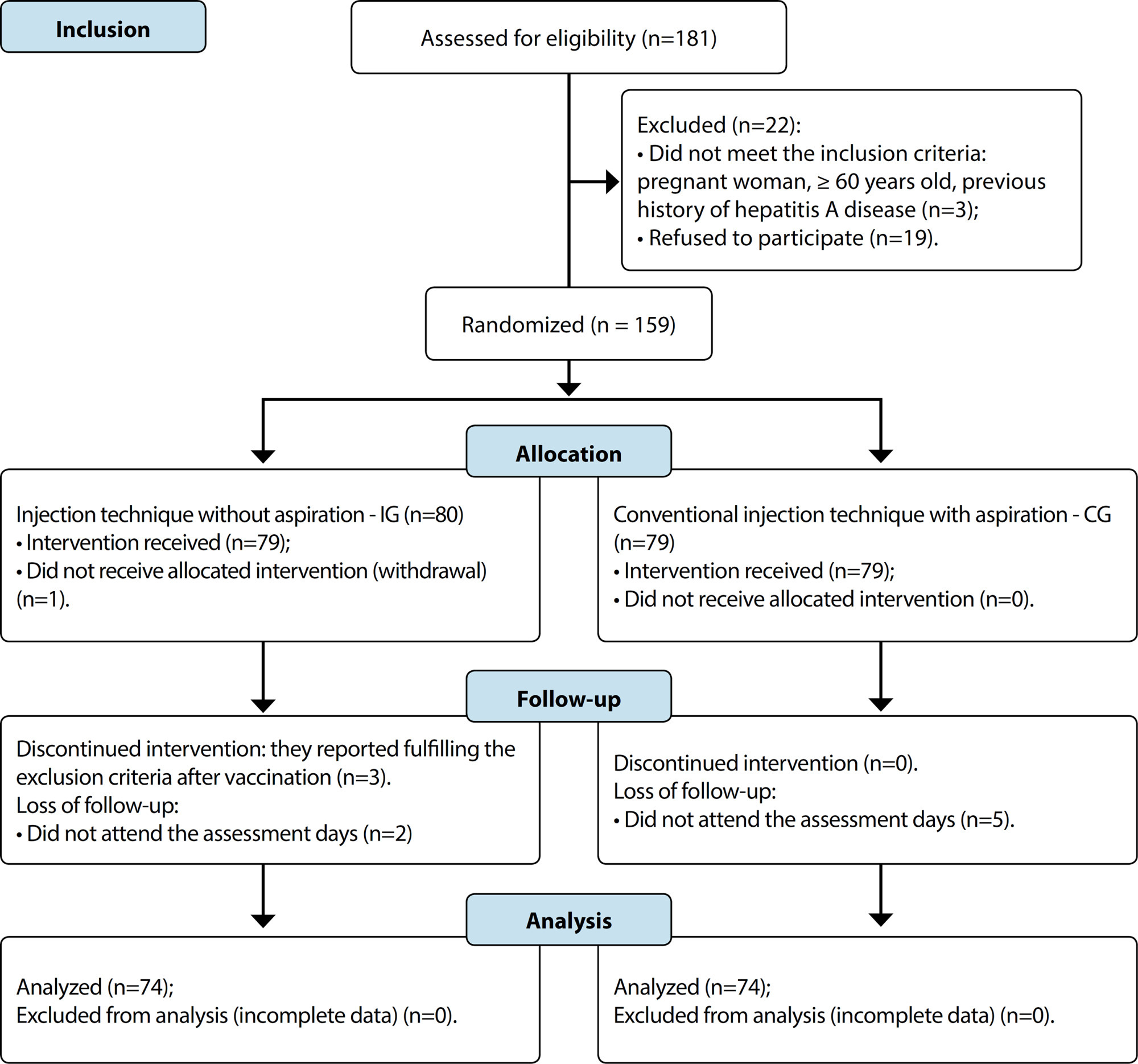-
ORIGINAL ARTICLE
Effectiveness of the modified Seldinger technique for peripheral central catheter in newborns: a randomized clinical trial
Revista Brasileira de Enfermagem. 2024;77(6):e20240189
12-16-2024
Resumo
ORIGINAL ARTICLEEffectiveness of the modified Seldinger technique for peripheral central catheter in newborns: a randomized clinical trial
Revista Brasileira de Enfermagem. 2024;77(6):e20240189
12-16-2024DOI 10.1590/0034-7167-2024-0189
Visualizações0ABSTRACT
Objectives:
to evaluate the effectiveness of peripheral central catheterization by comparing the modified Seldinger technique and the conventional technique in critically ill newborns.
Methods:
randomized unmasked clinical trial conducted in a public children’s hospital. Participation of 111 newborns with randomized allocation, 56 in the control group (conventional technique) and 55 in the experimental group (modified Seldinger). Success and absence of complications were evaluated as primary outcomes. The pain scale, difficulty in hemostasis, procedure time and number of punctures were considered secondary outcomes.
Results:
there was no statistical significance between groups, either for success (p=0.705) or absence of complications (p=0.347). A lower pain score, improved hemostasis, increased assertiveness with fewer punctures and reduced procedure time were not observed in the experimental group.
Conclusions:
the modified Seldinger technique did not prove to be a more effective insertion technology compared to the conventional method. Brazilian Clinical Trial Registry: RBR-69vks36.
Palavras-chave: Comparative Effectiveness ResearchNewbornPeripheral CatheterizationRandomized Controlled TrialTechnologyVer mais
-
ORIGINAL ARTICLE
Effect of cardiovascular biofeedback on nursing staff stress: a randomized controlled clinical trial
Revista Brasileira de Enfermagem. 2023;76(6):e20230069
12-04-2023
Resumo
ORIGINAL ARTICLEEffect of cardiovascular biofeedback on nursing staff stress: a randomized controlled clinical trial
Revista Brasileira de Enfermagem. 2023;76(6):e20230069
12-04-2023DOI 10.1590/0034-7167-2023-0069
Visualizações0ABSTRACT
Objective:
to assess the effect of cardiovascular biofeedback on nursing staff stress when compared to an activity without self-monitoring.
Method:
a randomized controlled clinical trial, carried out with nursing professionals from a university hospital. The intervention group (n=58) performed cardiovascular biofeedback, and the control (n=57) performed an online puzzle without self-monitoring, totaling nine meetings over three weeks. The outcome was assessed using the Stress Symptoms and Work-Related Stress scales, and the biological marker heart rate variability. The generalized estimating equations method was used.
Results:
the intervention had no effect on self-reported instruments (p>0.050). However, there was an effect of time (p<0.050) on all heart rate variability indicators, demonstrating changes over the sessions.
Conclusion:
cardiovascular biofeedback showed promising results in the biological marker, suggesting that it can be used in nursing staff as a complementary therapy by promoting better autonomic nervous system regulation.
Palavras-chave: BiofeedbackNursingOccupational HealthOccupational StressRandomized Controlled TrialTeamVer mais
-
ORIGINAL ARTICLE
Intramuscular injection safety without aspiration in the ventro-gluteal region during vaccination: randomized clinical trial
Revista Brasileira de Enfermagem. 2022;75(1):e20201119
08-20-2022
Resumo
ORIGINAL ARTICLEIntramuscular injection safety without aspiration in the ventro-gluteal region during vaccination: randomized clinical trial
Revista Brasileira de Enfermagem. 2022;75(1):e20201119
08-20-2022DOI 10.1590/0034-7167-2020-1119
Visualizações0ABSTRACT
Objectives:
to compare adverse events after administrating hepatitis A vaccine intramuscularly in the ventro-gluteal region between techniques with and without aspiration.
Methods:
randomized double-blind clinical trial, using hepatitis A vaccine (inactivated) in the ventro-gluteal region, with a sample of 74 participants in the intervention group, vaccinated with the slow injection technique without aspiration, and 74 participants in the control group undergoing slow injection with aspiration. Daily assessment of participants was carried out in the 72 hours after vaccination, in order to ascertain local, systemic adverse events, local and contralateral temperatures.
Results:
the occurrence of local and systemic adverse events was homogeneous between the groups in the three days after vaccination (p>0.05). There was no influence of sex, race, pre-existing disease and use of medication.
Conclusions:
the intramuscular vaccination technique without aspiration in the ventro-gluteal region is safe for adverse events following immunization compared to the conventional technique with aspiration.
Palavras-chave: Evidence-based NursingInjection Site ReactionInjections, IntramuscularRandomized Controlled TrialVaccinationVer mais



